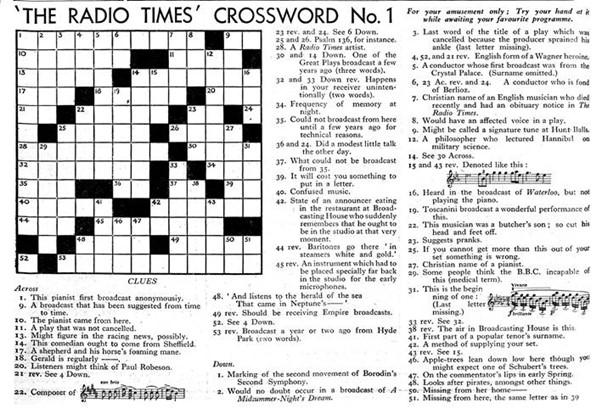Puzzles have been around for thousands of years — the Romans enjoyed word games that were a precursor to the modern crossword — but has there ever been a time like the present for getting stuck into a good old brainteaser?
As Radio Times launched this fun yet challenging puzzles website in late 2020 utilising our historic puzzle archive, here are nine things about word and number challenges that every puzzler might like to ponder.
The first crossword
The crossword as we know it today — as an integral element of a newspaper or magazine — is much younger than you might think. The first one — in the shape of a diamond — appeared in December 1913 in a paper called The New York World. The editor was Liverpool-born Arthur Wynne and he had a bit of space to fill. The crossword’s history in UK newspapers is a little vaguer. The Times crossword — a byword for ingenious setting and still a mark of status for those who can tackle it — first appeared on 1 February 1930. It proved such a hit that within two weeks The New York Evening Post was re-printing it. The first crossword appeared on the pages of Radio Times in 1933 and even included clues on musical scales:

Great crossword-lovers
If you love a crossword you’re in very good company. According to Adrienne Raphel, author of a splendid book about crosswords, Thinking Inside the Box, celebrity crossword addicts include Bill Clinton, Bill Gates, Daniel Craig, Kate Hudson, Natalie Portman and Sting. But perhaps the crossword-lover closest to the hearts of Radio Times readers is Inspector Morse, for whom solving cryptic clues was merely an extension of his work. Morse’s creator, Colin Dexter, was projecting his own love of crosswords on to his most famous creation. Indeed, Dexter wrote a how-to guide to solving crosswords, Cracking Cryptic Crosswords.
The crossword comes to Springfield
When, back in 2012, The Guardian ran a series called the Top 10 Crosswords in Fiction, Morse came in at only number three. Top of the list was The Simpsons, thanks to Lisa’s love of crosswords and the crossword tournament that plays out in an episode in the 20th series of what many people regard as the best show on TV. Number two on the list was Dorothy L Sayers’s Lord Peter Wimsey — like Morse, another crossword-loving detective — with other “crossword in fiction” accolades going to The West Wing, The Rise and Fall of Reginald Perrin and the Madness song Cardiac Arrest. Adrienne Raphel highlights the importance of crosswords to Sex and the City narrator Carrie Bradshaw.
Crossword puzzle setters
In the spirit of keeping things hidden, the setters of cryptic crosswords have delighted in using pseudonyms — the more exotic the better — to hide their true identity. Would the Guardian’s celebrated Araucaria have had quite the same mystique if readers had known that in real life he was the Rev John Galbraith Graham? Other great crossword setters include Osmosis, Scorpion, Adamant, Dante, Enigmatist, Falcon, Merlin, Phi and Viking. In 2013 Roger Squires of the Telegraph was hailed in the Guinness Book of World Records as the most prolific setter, having set nearly 75,000 puzzles and 2.25 million clues over the course of some 50 years. And where, in 1963, did Roger set his first ever puzzle? Why, Radio Times.
The best clues
It was in Radio Times that Colin Dexter revealed his favourite ever clue. It was one set by Roger Squires and it read: “Bar of soap (3,6,6)”. And the answer? “The Rovers’ Return” — ie the pub (bar) in the soap Coronation Street. All manner of stories swirl around D-Day and crossword answers that were supposed to contain hidden messages. In the months before the Allied invasion of France in June 1944, the words “Gold”, “Sword” and “Juno”, all the names of landing beaches in Normandy, appeared in The Daily Telegraph crossword solutions. But were they just coincidence?
Acrostics
An offshoot of crosswords, an acrostic is a word puzzle with which our own Enigma game has elements in common. Acrostics are all about matching letters (and sometimes numbers) to reveal hidden words and phrases. The term is derived from the Greek words akros, “at the end”, and stichos, “line”, and history records numerous instances of writers trying to conceal a message they wouldn’t dare spell out openly. A famous example involved James May — later to become a Top Gear star — being sacked from Autocar magazine for writing a review of the year in which the first letter of each review spelt out the message, “So you think it’s really good, yeah? You should try making the bloody thing up; it’s a real pain in the arse.”
Sudoku
We all know that Sudoku hails from Japan but what does the word actually mean? I’m grateful to sudoku.com for providing the answer: “Sūji wa dokushin ni kagiru” – which translates as “the digits are limited to one occurrence.” I say “hails from” Japan because that’s where it got its name when it first appeared in 1984, but the same idea had already appeared as a puzzle in the US five years previously. Called Number Place, it was the work of puzzles inventor Howard Garns and was published in Dell Pencil Puzzles and Word Games magazine. So what’s in a name? Quite a lot, it seems.
Sudoku Squared
The Sudoku phenomenon took hold in the UK in 2004 and 2005. The Times was the first UK paper to publish Sudoku. Other publications rapidly followed suit. Sudoku came in different levels of difficulty and in the days when we had packed trains, half the passengers seemed to be playing Sudoku. Put “Sudoku Puzzle Books” into Amazon and you’ll get more than 60,000 results. The internet throws up a figure of 167 million Sudoku players in the US, out of a population of 328 million. Sudoku on live TV came along in 2005 when Carol Vorderman of Countdown fame presented Sudoku Live on Sky One. The BBC soon came up with its own Sudoku programme.
Sudoku number crunchers
The first Sudoku world championships were held in Lucca in Italy in 2006. The winner was Jana Tylova of the Czech Republic. The 13 championships since have been dominated by three players: Kota Morinishi of Japan (four times a winner, three times the runner-up); Thomas Snyder of the US (three times a winner and once the runner-up); and Jan Mrozowski of Poland (three times the winner). London hosted the championships in 2014 but no British player has ever featured in the top three spots. The cancelled 2020 championships were due to be held in Shanghai, which will host in 2021 if the event takes place. There might not be any Sudoku world championships but there are always plenty of Sudoku on the Radio Times puzzles site for you to test yourself!
SIMON O’HAGAN
If this has inspired you to get your gears turning, simply click here to purchase a membership to Radio Times Puzzles now, starting from just £2.99 per month.
